Most people had signed up to to take
a 2 hour cruise around the ports.
We crossed the street towards the Maritime Museum, formerly the ferry
building, and down a ramp to a dock and onto the vessel "Spirit"
captained by Marcus Wilson who also narrated much of the cruise.
The
other narrator was Sue Lai, a transportation engineer from the Port of
Los Angeles. The harbor cruise basically did a counterclockwise
loop
around Terminal Island, the largest man made island in the world.
The
first order of business on the cruise was towards the Vincent Thomas
Bridge. As we departed, the special Metrolink train was moved
onto a
yard track to allow the Port electric trolley to resume operation.
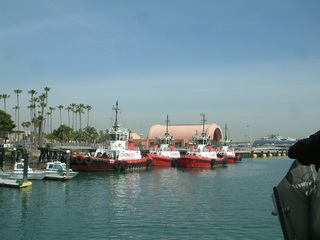
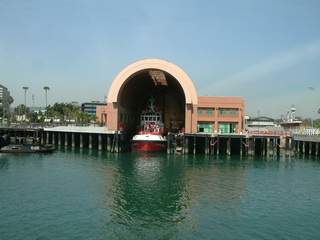
Just up the channel from our
departure point, the City of Los Angeles
has their dock for police patrol boats and a fire station. This is the
one which was chronicled on California's Gold by Huell Howser.
The
fire station has a covered dock and the old fire boat Ralph J. Scott is
sitting on a cradle on dry land.
There was a large
container ship at the Evergreen terminal being loaded with a container
being loaded or unloaded every ninety seconds. Captain Wilson
explained that the bunker barge moving towards us under the bridge was
for refueling the ships. It is safer to take the fuel to the ship
rather than moving a giant ship to a fuel dock.
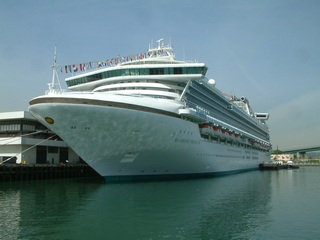
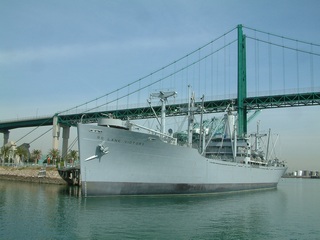
Further on up the road, rather the
channel, is the cruise ship dock where the Diamond Princess ship was
being readied for a cruise. A ship such as this one has the
capacity
for 2,000 guests and a crew of 1,200. Just south of the bridge is
the
S.S. Lane Victory, a WWII merchant marine ship which also served in
Korea and Vietnam and still goes out on cruises. The Vincent
Thomas
Bridge, built somewhere around the 1960's collected a 50 cent toll for
its first 35 years in the westbound direction only. According to
Captain Wilson, the state figured out that is cost 49 cents to collect
the 50 cent toll and finally just stopped collecting and removed the
toll plaza. The bridge is lighted from 6 PM to midnight. It
is
visible at night while travelling southbound on the Interstate 110
Harbor Freeway.
On the San Pedro side of the bridge
and north of it is
a 2 year old ternimal which is environmentally friendly. Most
ships
have to run their motors while docked, but at this new terminal, the
ship plugs into the City of Los Angeles Department of Water and Power
electric grid and thus can stop its motor and not generate fossil fuel
pollution.
The Spirit did a "U" turn
in the West Basin and passed
the former Delta Steamship Line terminal, which can still be used in
for cruise ship operations. We continued past the Evergreen
Terminal
toward an arm of the Dominguez Channel. Captain Wilson explained
that
containers are manufactured in a variety of sizes. Most are 20 or
40
feet in length with others as large as 53 feet. Ships contain
many
containers under the deck and piled above deck.
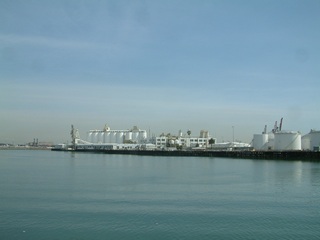
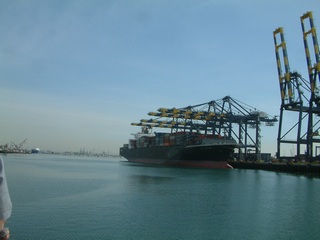
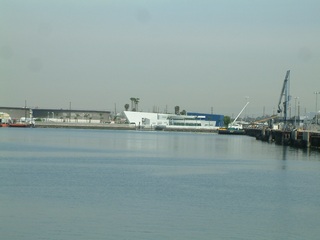
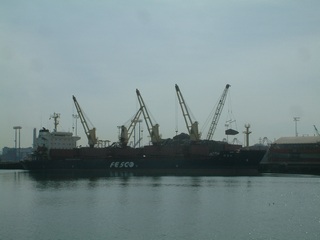
Looking northerly up
one channel arm, we could see Banning's Landing, formerly home to the
S.S.
Catalina, now a
community center for Wilmington residents. Once a year, the City
of
Los Angeles has free harbor cruises similar to this one. One the
southerly side of the main channel, is Hugo-Neuproler, a scrap metal
shipper. This facility handles 3,000 carloads of scrap metal
annually.
Steel mills will pay a higher price for scrap for more finely ground up
metal. Metal seems to have almost as many lifetimes as a
cat. Steel may
travel across the Pacific Ocean as many as 7 times being product one
direction and scrap the other direction.
Page 3 APTA Alameda Corridor & Harbor
Cruise